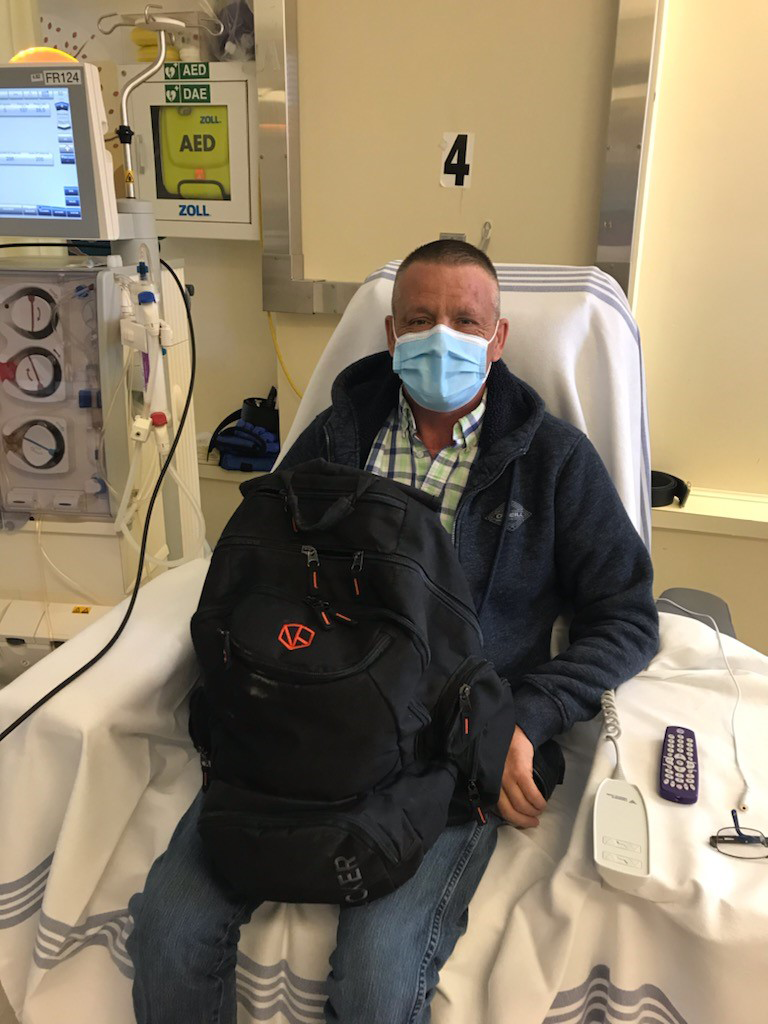
For nearly a decade, Tom Benson has carried a backpack filled with his medical information to his appointments. He says his wife has kept every piece of information related to Tom’s health since he began to have healthcare needs that require complex care.

Tom has diabetes, sarcoidosis of the lungs, renal failure and has recently had an aortic valve replacement. As a result, he is regularly at the QEII Hospital in his home town of Grande Prairie, primarily for his dialysis three times a week. He also frequently makes the eight-hour round trip drive to Edmonton as his care team prepares him for a kidney transplant scheduled for May. He says his backpack of medical records is the only way he has answers at the ready for each appointment.
“Thankfully, my wife is organized, because lot of times I get asked about a certain date and I have no clue in the world… They ask if this has been done or not been done, what medications you're on,” he explains. “Do I answer them correctly? Well, as correctly as I can. I can tell you what's been done. I can't tell you what medication they have me on because I don't remember it.”
He describes an emergency room visit when he didn’t bring his records with him.
“I wasn't feeling well; I had the flu. And the doctor spent all night working on me to find out that I had renal failure,” he says. Tom felt that if that doctor had access to his full history he would have the information at his fingertips to identify something he has been living with for years.
But now, he says, in the few weeks since Connect Care launched in his area, everything has changed. Suddenly, his backpack full of appointment letters, test results, care programs and every other scrap of his health information, isn’t necessary. For the first time his appointments begin with all of his information in front of his provider.
He talks about recent Positron Emission Topography (PET) scan that went so quickly he and his wife wondered if staff had forgotten to ask the usual litany of questions.
“As we got farther along in the process, I realized they knew. They knew I had kidney disease; they knew what to do. My blood pressure went too high and they just went into the computer system and said, ‘this is what we're going to do and you'll be fine. And then next time, this is what we want you to do when we bring you back.”
Having all of Tom’s health history readily available is even more important now as Tom’s care team is preparing him for a kidney transplant. The University of Alberta Hospital Transplant Program in Edmonton and the hospital’s inpatient unit both launched Connect Care in November 2019 as part of Wave 1. Because of this, members of those teams have been able to review everything of Tom’s and of his living donor’s health: case summaries, dialysis outcomes, medication history, allergies – for the first time, everything they need to prepare is at their fingertips.
Tom’s situation isn’t unique, nor are the real changes he will see with Connect Care. In Alberta, kidney care patients are first treated in Calgary’s Foothills Medical Centre or Edmonton’s University of Alberta Hospital before transitioning to a longer-term program in one of 47 dialysis units across the province.
With Connect Care, for the first time all of a patient’s information will travel from site to site with them. The same goes for complex care patients of all sorts, whether receiving organ transplants, cancer treatment or are in transition from hospital to community long-term care.
The province-wide clinical information system, which supports Connect Care, will house all of the information AHS, partners and affiliate teams need to provide care in a common and centralized system across Alberta. Connect Care continues to be rolled out in a phases across the province and is scheduled to be in place throughout Alberta by 2023. The next Wave will include 57 sites across the Edmonton and Calgary Zones. More information about Connect Care can be found at ahs.ca/connectcare..